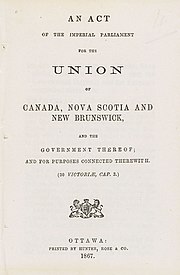| Maher v Town Council of Portland | |
|---|---|
 The Maher decision was one of the first cases interpreting s. 93 of the British North America Act, 1867 | |
| Court | Judicial Committee of the Privy Council |
| Full case name | Henry Maher v Town Council of Portland |
| Decided | August 6, 1874 |
| Citations | [1874] UKPC 83 (for record of proceedings in the Judicial Committee); Wheeler's Confederation Law of Canada (London: Eyre & Spottiswoode, 1896), pp. 362-366 (for reasons for judgment) |
| Case history | |
| Appealed from | Ex parte Maher, Supreme Court of New Brunswick, June 17, 1873 (unreported) |
| Related actions | Ex parte Renaud (1873), 1 N.B.R. 273 (N.B. S.C.). |
| Court membership | |
| Judges sitting | Sir James W. Colvile Lord Justice Mellish Lord Justice James Sir Montague E. Smith Sir Robert Collier |
| Case opinions | |
| The Common Schools Act of New Brunswich was constitutional and did not infringe denominational school rights protected by s. 93 of the British North America Act, 1867 | |
| Decision by | Lord Justice James |
| Keywords | |
| Constitutional law; division of powers; denominational schools | |
Maher v Town Council of Portland [1] is a Canadian constitutional law court decision dealing with the constitutional guarantees for denominational schools set out in section 93 of the Constitution Act, 1867 [2] (formerly the British North America Act, 1867). The issue was whether the Common Schools Act,[3] enacted by the Province of New Brunswick in 1871, infringed the guarantee of denominational schools set out in section 93(1).
The court case was part of the larger debate on public funding and the role of the churches in public affairs in New Brunswick. The litigation was triggered by the Legislature of New Brunswick passing the Common Schools Act, which explicitly provided that public schools were to be non-sectarian, open to all, and under the supervision of a provincial Board of Education. Some schools under the previous system had been under the effective control of particular religious denominations, in areas where the adherents of those denominations were in the majority. Opposition to the new school system came from the Roman Catholic Church and the Anglican Church.
The case was ultimately decided by the Judicial Committee of the Privy Council in Britain, at that time the court of last resort for Canada within the British Empire. The Judicial Committee held that the parish schools established under the previous law, the Parish Schools Act of 1858,[4] were not denominational schools established by law, and were not within the protection of section 93(1). The new Common Schools Act therefore did not infringe any legal "right or privilege" possessed by anyone in New Brunswick at the time of Confederation and was constitutional. Maher v Town Council of Portland was the first case decided by the Judicial Committee under section 93 of the Constitution Act, 1867.
- ^ Maher v Town of Portland [1874] UKPC 83 (6 August 1874), P.C. (on appeal from New Brunswick)
- ^ Constitution Act, 1867, 30 & 31 Victoria, c. 3. (U.K.), R.S.C. 1985, App. II, No. 11, s. 93.
- ^ Common Schools Act, S.N.B. 1871, c. 21.
- ^ Parish Schools Act, S.N.B. 1858 (21 Vict.), c. 9.